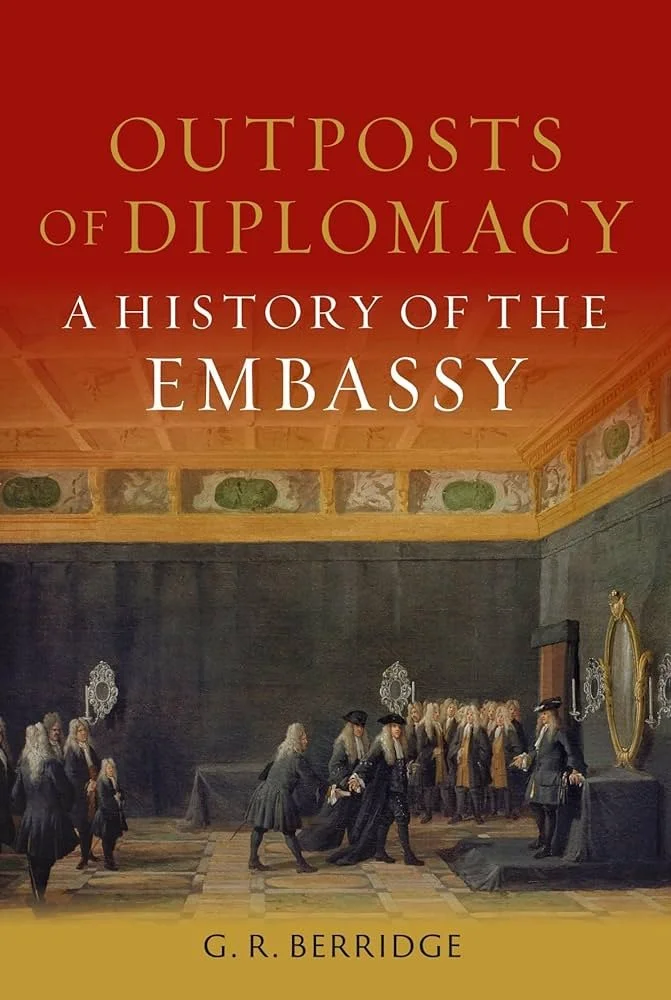Outposts of Diplomacy by G. R. Berridge
/Outposts of Diplomacy: A History of the Embassy
By GR Berridge
Reaktion Books 2024
A fierce and forceful man named David Jayne Hill was asked by a friend, “Honestly, isn’t this all simply showmanship? If Germany declares war on Washington, you’ll be on a fast train headed to the border just the same as everybody else.” Hill, who’d just recently been appointed US ambassador to Germany, answered urbanely: “Not at all, not at all. If my German counterpart is second cousin to the Kaiser, the possibility of war is no longer a theoretical thing – it has a face. At the very least, it has my face. That in itself makes your declaration of war less likely.”
Hill made his comment in 1908 and was therefore just about as wrong as a human being could possibly be. But the basic sentiment he was expressing has twined like a stubborn weed through international relations for centuries if not millennia, and that sentiment is at the heart of Outposts of Diplomacy, the surprisingly captivating new book by GR Berridge, Emeritus Professor of International Politics at the University of Leicester. He studies the nature and evolution of the resident embassy, which took root in the fifteenth century and began to institutionalize in the mid-sixteenth century, when increasingly prosperous city-states wanted any marginal advantage they could reap from having representatives of their rivals just down the street in their own town.
In these pages, Berridge gives readers not only a smoothly-paced and quietly eloquent account of that embassy evolution but also a marvelous gallery of the people who led those embassies. In most cases, these people had an unenviable task: they were dealing with duplicitous hosts, warring street factions, capricious rulers, and, sometimes worst of all, each other (Berridge of course relates the story of “devious and hot-tempered” Elizabethan diplomat Nicholas Throckmorton pulling a knife on a colleague). On top of which, the whole undertaking could be quite expensive, as illustrated by the case of Sir Benjamin Keene, British ambassador to the court of Ferdinand VI of Spain. Keene was feted at his post in the 1720s, but as Berridge points out, friendship is one thing, but confidence is very different – and usually more costly. “It was a further six months,” Berridge writes, “before Keene, who was no fool, felt able to tell his close friend, Abraham Castres, in one of [his] letters, that he felt he had obtained this, and it had cost him ‘some pains to thaw the ice.’”
Of course, some of this ice-thawing was a bit less voluntary. As Berridge points out, n the wake of the Treaties of Tientsin in 1958 and the Conventions of 1860, China seemed to have no choice but to allow foreign legations in Peking. “The uncomfortable but unavoidable corollary of this,” Berridge writes, “was the formation for the first time of a Chinese foreign ministry, the Tsungli Yamen, to deal with the barbarians.”
The right sort of ambassador, one capable of navigating these tricky shoals, could sometimes become close to a ruler, flattering him, providing him with news and gossip, and “at a rocky moment setting his heart aglow by whispering in his ear the word ‘pension.’” This kind of intensely personal element was an important and often under-chronicled aspect of the job, and Berridge’s decision to fill his book so delightfully with personalities brings it right into the spotlight where it belongs. And against the charge that diplomatic embassies have been rendered obsolete an age where national leaders can pick up an encrypted cell phone and talk with each other directly (and even conduct illicit deals by dismissing all of their countrymen from the conversation ahead of time), Berridge is predictably bullish, noting that embassies still have plenty of their elusive interpersonal work to do, smoothing out official negotiations, gently lobbying for official counterparts to listen to the better angels of their natures, putting a whispered word of advice in just the right ear.
“Diplomacy,” Berridge wonderfully sums up, “is the art of conducting business between states without resort to force, propaganda or law,” and Outposts of Diplomacy so entertainingly dramatizes this shop-talk world that readers will be wishing the book were three times its length.
Steve Donoghue is a founding editor of Open Letters Monthly. His book criticism has appeared in The Washington Post, The American Conservative, The Spectator, The Wall Street Journal, The National, and the Daily Star. He has written regularly for The Boston Globe, the Vineyard Gazette, and the Christian Science Monitor and is the Books editor of Georgia’s Big Canoe News
